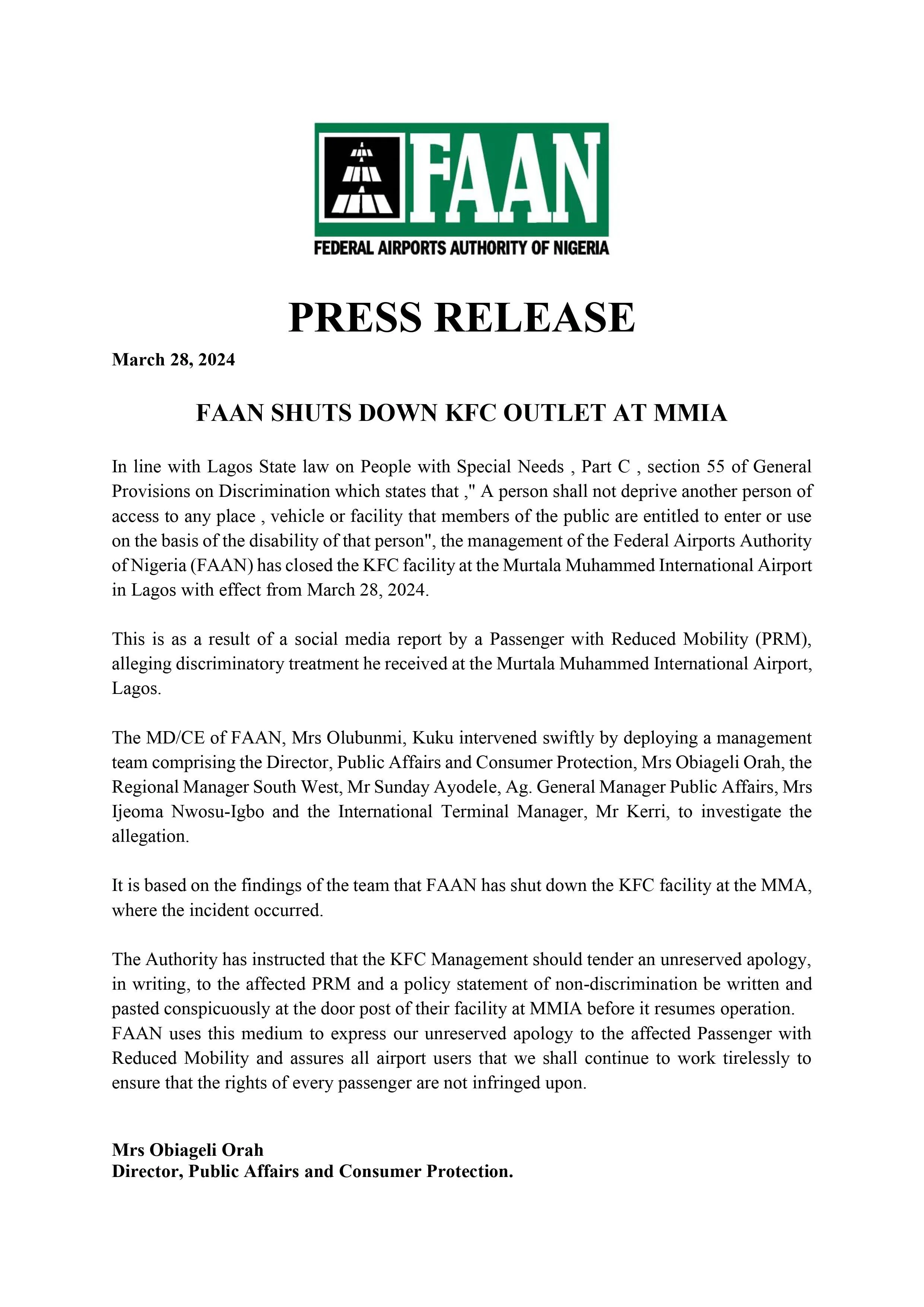From Discrimination to Decisive Action: The KFC Incident at Murtala Muhammed International Airport
In a series of tweets that have since gone viral, a disabled Nigerian man shared his harrowing experience of discrimination at a KFC outlet in the Murtala Muhammed International Airport in Lagos. The incident, which occurred on March 28, 2024, has sparked outrage and prompted swift action from the Federal Airports Authority of Nigeria (FAAN).
The man, a frequent flyer who is well-acquainted with airport procedures, had chosen to visit the KFC restaurant while awaiting his Virgin Atlantic flight to London. Upon entering the establishment with his wife and brothers, he was abruptly confronted by the KFC manager who loudly declared, "NO WHEELCHAIRS ALLOWED."
Despite attempts by the man's family to reason with the manager, she remained adamant about the restaurant's policy prohibiting wheelchairs and wheelchair users from the premises. The situation escalated, leading to a heated exchange and the man's family eventually leaving the restaurant, but not before capturing video and photographic evidence of the incident.
Determined to address the injustice, the man's wife and brother returned to the KFC outlet under the guise of purchasing food. While covertly recording audio, they questioned the manager once more about the discriminatory policy. The manager confirmed that the no-wheelchair rule was strictly enforced, even though she had recently been transferred to that branch.
In his tweets, the man expressed the deep hurt and humiliation he felt as a disabled person in Nigeria. He drew parallels between KFC's discriminatory policy and the dark chapters of history when individuals were segregated and denied access based on their race or ethnicity.
The man highlighted the fact that approximately 27 million Nigerians, or roughly 13% of the population, live with some form of disability. He emphasized that one in six people worldwide are disabled and must be treated with dignity and respect.
Calling on KFC and KFC Nigeria to address the incident, the man questioned whether he was not "human enough" for their establishment. He vowed to pursue the matter until a satisfactory resolution was reached.
KFC Nigeria initially responded with a brief statement apologizing for the man's "poor experience" and promising to investigate the incident. However, many found the response lackluster and failing to address the gravity of the situation.
In a follow-up statement, KFC Nigeria took a stronger stance, emphasizing their commitment to inclusivity and respect. They outlined immediate actions, including sensitivity training for all employees and a pledge to explore solutions to ensure a welcoming environment for all guests.
The incident caught the attention of the Federal Airports Authority of Nigeria (FAAN), which took decisive action in line with the Lagos State law on People with Special Needs. FAAN shut down the KFC outlet at the airport and mandated that the management issue an unreserved written apology to the affected passenger and display a conspicuous non-discrimination policy before reopening.
FAAN's swift response sent a powerful message about the importance of upholding the rights and dignity of persons with disabilities. It highlighted the need for businesses to foster inclusive environments and the consequences of failing to do so.
This story serves as a reminder of the ongoing struggle for equal rights and access faced by individuals with disabilities in Nigeria and around the world. It underscores the need for heightened awareness, sensitivity, and proactive measures to dismantle barriers and promote inclusivity in all aspects of society.
As the man's experience galvanized public attention and sparked a broader conversation about discrimination, it became clear that change is not only necessary but long overdue. The incident at the Lagos airport KFC may have been a single event, but it reflects a much larger issue that demands collective action and a commitment to building a more equitable and inclusive world for all.

